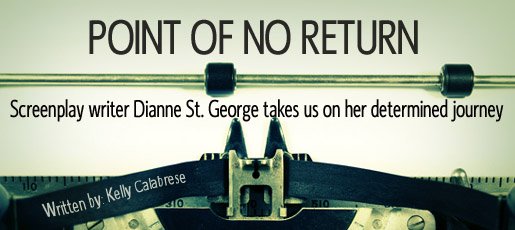You THINK you’ve heard this story…
Page 5: A writer decides to create a screenplay about “what she knows.”
Page 15: A friend offers up inspiring advice that gets this writer going.
Page 30: The point of no return – Woman vows to finish the script, no matter what!
Page 90: Violins signal tough times ahead.
Indeed – this formula exists in nearly every new screenwriter’s life… yet, for screenwriter Dianne St. George, the above rings true and so much more.
Dianne St. George took some really bold steps to help move her story forward. So NYCastings asked for the highlights of her journey…
Q&A with Screenplay Writer Dianne St. George
Q: How did you decide on the ‘type’ of story you wanted to tell?
As I researched and read about screenwriting, I repeatedly came across the suggestion that people should write about what they know or have experience with, so that was the most important thing to me as I attempted to write my first screenplay.
Q: What inciting incident prompted you to actually start writing?
At first I was hesitant to write about this topic because it is one of the most controversial political issues of our time, but a friend convinced me. He said, “You have to think about this as being bigger than yourself. Put aside what people are going to think and just write because you can clearly write about it from personal experience and it is such a relevant topic right now.” He felt that I would be able to bring the political and the social aspects of the topic together.
Q: What was your point of no return?
Once I could see the arc of the story from beginning to end. Writing a screenplay, especially for the first time, is such a massive undertaking, to try and harness all of the information into a clear and strong story and have it all come together in a cohesive way. You need certain things to happen in the story but it also has to make sense. You have to be true to the story and the characters. Once I saw that I could get from point A to point Z and hit all the necessary points along the way while still being true to the story and the characters, I knew I would be able to successfully finish the project .
Q: Every story has a series of high/low points. What are some major moments that moved your journey forward?
I began to research script doctors which is yet another part of the learning curve. There are a lot of them out there that writers can find for only a few hundred dollars. I initially went to one in that price range, but was not happy with what I got. It wasn’t as much about whether or not they liked the story, but rather how they addressed the issues, and I felt that it wasn’t a very helpful experience in that regard.
At that point, I decided to speak to an entertainment attorney and get some information. I had heard and read that since many producers will not accept cold submissions of a script, but require that they come from an entertainment attorney or an agent, there is a chance the attorney can pass the script onto them. An entertainment attorney can easily cost a couple of thousand dollars to retain, but I was willing to spend the money because this was something I really wanted to do.
Q: Major turning point?
Even though I had retained an attorney, I still did not feel as though I was giving her the best possible version of my script and knew I still had to find a good script doctor. During my research, I came across a magazine called Creative Screenwriting, featuring an article about an experiment they did to test out script doctors. They took $10,000 and a handful of script doctors and gave out a script that they purposely filled with flaws. Then, in the article, they wrote in great detail about their findings, showing what you get for your money with each of the script doctors in the experiment. The bulk of the script doctors cost anywhere from $125-$700. Some got good reviews and some got bad reviews. But then there was the clear winner whose cost was double or triple the cost of the other script doctors, but whose services were far above the rest – and her name is Dara Marks. The review said, “At least once in your life, take a suite at the Ritz Carlton, buy an Armani suit or a pair of Manolo Blahnik shoes, and have a script analyzed by Dara Marks. It’s expensive but there is nothing else like it.”
And, it turned out to be true. But I didn’t just run right out and call her. I read her book Inside Story first before investing that kind of money. After only a few chapters into the book, I knew she was the best script doctor I could find and well worth spending the money on. The feedback I received from her about my script, when compared to the first script doctor I went to, was incomparable. Dara spent four hours on the phone with me and gave me mp3 files of the entire session, as well as a written analysis. But even more important than the quantity of the service was the quality of the service as she helped me address all of the major and minor issues in my story. Dara knows right where to go to find the flaws and the best way to address them.
After we were done, I asked her if I could come back again. She did not need to solicit my return business like other script doctors. I wanted to come back to her because I knew that I now had what I needed to develop the arc of the story and wanted to address other issues next time including the length of the script, the dialogue and transitioning from one scene to another. When I did go back to Dara for the second time, her feedback was awesome yet again. She went through the script page by page both during the phone session and mailed me a hard copy of the script with all of her notes on it as well.
It was beneficial to go to her twice because it is important to have a clear concept throughout the story and to get the arc of the story exactly right before fine tuning it. As writers, the one thing that we can control is the quality of the script that we put out there, and finally having a great script doctor like Dara Marks behind me was a major turning point.
Q: What is the lowest point of this screenplay mission?
I have to wonder, “How many years have I put in already and what will it all be for?”
I’m at a good point in the sense that the hard work is done and I have a finished script that I believe is very well done. But I am now in what may be the most difficult part of this process which is confronting the question, “How do I get my script made into a movie?”
It’s scary to face the possibility that after all of the time and effort I have put into this script, it may never get made as a film. It’s one thing to get a chance to have your script made into a film and have it be judged as being a good movie or bad movie. But not to be given a chance at all…there is nothing worse than that.
Screenwriters, along with other artists, are not like those in any other traditional professions whose paths are very mapped out- you go to college (if required for your field), get a degree, go for job interviews, get a job and work your way up the ladder of success within the company. For screenwriters, there is no formula. You may be fortunate enough to have sufficient finances to make your own film, you may know someone who may know someone in the film making industry, you may have success in a screenwriting competition…I have even contemplated making a trailer. But no matter what path or paths you take, you have to keep persisting and find a way, and accept the fact that it can take a long time before connecting with the right person who likes your story and is willing and able to help you get it off the ground.
Q: If you could imagine your own resolution, how would your screenplay writing journey end?
I would get my story made into a film, it would be made by an amazing team of people and it would be a successful, inspiring story that is well received, positively affects moviegoers and allows me the opportunity to do another, and another, and another…that is the dream!







